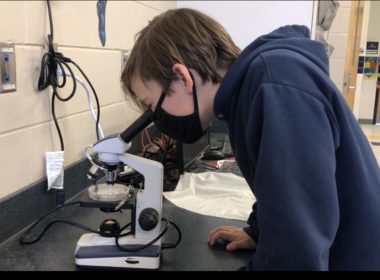Microplastics-Small but Deadly
1st Block Summary of Microplastic in
Local Waters- Research
While microplastics are small and often invisible to the naked eye, their impact on marine ecosystems is tremendous. We learned that microplastics can enter the ocean as small particles like microbeads in clothing, or they can be formed from larger plastics like bottles, bags, and straws. Microplastics are often mistaken by marine life for food, and they often contain or carry on their surface chemicals that are harmful to animals that accidentally eat the plastics. We humans eat the seafood and ingest plastics as well.
2nd Block Summary of Microplastics in
Local Waters- Investigation
We sampled our very own tap water from home and viewed the sample under a microscope. Athome, we filled two glass jars with water from our bathtub faucet. We filtered the water sample and examined, analyzed, and charted the microplastic type(s) from each sample. The
2nd glass jar was transported to MS State University for a graduate student’s own microplastic research.
3rd Block Summary of Microplastics in
Local Waters-Action Project
After we collected our samples and analyzed the data, we then began our Action Project. Our Action Project is a plastic recycling project at our school in hopes of our whole school district partnering with us to begin a recycling program at each school. Each week over 500 empty water bottles are collected and placed in a large recycling container from Waste Pro. Waste Pro picks up the plastic bottles and carries them to a local recycling company.
4th Block Summary of Microplastics in our Local Waters-Earth Day Book
Because of our microplastics investigation, we created a book titled Earth Day, Everyday, In our book, we illustrated and wrote how our Earth should look like. In our book, we wrote how to help students discover how they can pitch in to save the Earth with simple, kid-powered approaches, and why it’s vital for all of us to protect our Earth. We hope our book will inspire children and adults to make the world a cleaner and more beautiful place to live.


Do you find this ACT Interesting? How do you think this ACT will help your community? Does this ACT spark ideas for a new investigation?
Provide some feedback to the community.